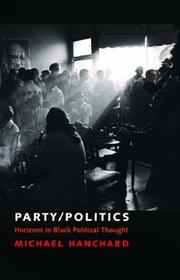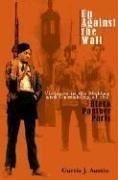| Listing 1 - 10 of 21 | << page >> |
Sort by
|

ISBN: 9780195176247 0195176243 Year: 2006 Publisher: Oxford : Oxford University Press,
Abstract | Keywords | Export | Availability | Bookmark
 Loading...
Loading...Choose an application
- Reference Manager
- EndNote
- RefWorks (Direct export to RefWorks)
Black panther party for self defense (États-Unis) --- Opinion publique --- Black power --- Partis politiques --- Noirs américains --- États-Unis --- Vie intellectuelle --- Politique et gouvernement --- Relations interethniques --- 1945-....
Book
ISBN: 3986840087 Year: 2022 Publisher: Münster : Unrast Verlag,
Abstract | Keywords | Export | Availability | Bookmark
 Loading...
Loading...Choose an application
- Reference Manager
- EndNote
- RefWorks (Direct export to RefWorks)
These records report the investigation of the Winston Salem, North Carolina, chapter of the Black Panther Party.
Book
ISBN: 9781438475448 1438475446 9781438475431 1438475438 Year: 2019 Publisher: Albany : State University of New York Press,
Abstract | Keywords | Export | Availability | Bookmark
 Loading...
Loading...Choose an application
- Reference Manager
- EndNote
- RefWorks (Direct export to RefWorks)
Black power --- African American political activists --- African Americans --- History --- Politics and government --- Black Panther Party --- United States --- Race relations --- Afro-American political activists --- Political activists, African American --- Political activists --- Black Panthers --- BPP (Black Panther Party) --- B.P.P. (Black Panther Party) --- Black Panther Party for Self-Defense

ISBN: 1299401945 1610754441 9781610754446 1557288275 9781557288271 1557288275 9781557288271 9781557288752 1557288755 9781299401945 Year: 2006 Publisher: Fayetteville University of Arkansas Press
Abstract | Keywords | Export | Availability | Bookmark
 Loading...
Loading...Choose an application
- Reference Manager
- EndNote
- RefWorks (Direct export to RefWorks)
African Americans --- Black power --- Political violence --- Violence --- Political crimes and offenses --- Terrorism --- Politics and government --- History --- Black Panther Party --- Black Panthers --- BPP (Black Panther Party) --- B.P.P. (Black Panther Party) --- Black Panther Party for Self-Defense --- History. --- United States --- Race relations --- Biography --- 20th century
Book
ISBN: 0813058600 0813057493 0813066395 9780813057491 9780813065458 0813065453 9780813066394 Year: 2020 Publisher: Gainesville
Abstract | Keywords | Export | Availability | Bookmark
 Loading...
Loading...Choose an application
- Reference Manager
- EndNote
- RefWorks (Direct export to RefWorks)
In the tumultuous year after Martin Luther King Jr.'s assassination, Pete O'Neal founded the Kansas City branch of the Black Panther Party. 'Black Panther in Exile' is his gripping story. One of the most influential members of the movement, he now lives in Africa - unable to return to the United States but refusing to renounce his past.
African American political activists --- African Americans --- Americans --- Civil rights --- History --- O'Neal, Pete. --- Black Panther Party --- History. --- Yankees --- Ethnology --- Afro-American political activists --- Political activists, African American --- Political activists --- Black Panthers --- BPP (Black Panther Party) --- B.P.P. (Black Panther Party) --- Black Panther Party for Self-Defense
Book
Abstract | Keywords | Export | Availability | Bookmark
 Loading...
Loading...Choose an application
- Reference Manager
- EndNote
- RefWorks (Direct export to RefWorks)
Amerique --- Black power. --- Etats-Unis. Black Panthers. Documents. --- Etats-Unis. Politique intérieure Noirs. --- Noirs américains --- Noirs --- Politique internationale. Noirs. --- Etats-Unis --- Liberation --- Noir --- Non-Violence --- Pouvoir. --- Politique et gouvernement. --- Droits. --- Black panther party for self defense (États-Unis). --- États-Unis --- Relations raciales.
Book
ISBN: 1469606259 0807895857 9780807895856 9781469606255 9780807871133 0807871133 9780807833766 0807833762 9798893133783 Year: 2010 Publisher: Chapel Hill [N.C.] : University of North Carolina Press,
Abstract | Keywords | Export | Availability | Bookmark
 Loading...
Loading...Choose an application
- Reference Manager
- EndNote
- RefWorks (Direct export to RefWorks)
Living for the City: Migration, Education, and the Rise of the Black Panther Party in Oakland, California
Education, Higher --- African Americans --- College students --- Higher education --- Postsecondary education --- Universities and colleges --- Afro-Americans --- Black Americans --- Colored people (United States) --- Negroes --- Africans --- Ethnology --- Blacks --- History --- Education (Higher) --- Migrations --- Social conditions --- Politics and government --- Education --- Black Panther Party --- Black Panthers --- BPP (Black Panther Party) --- B.P.P. (Black Panther Party) --- Black Panther Party for Self-Defense --- History. --- Oakland (Calif.) --- City of Oakland (Calif.) --- Ethnic relations. --- Black people
Book
ISBN: 1613122993 9781613122990 9781419722400 1419722409 Year: 2016 Publisher: New York : Abrams, an imprint of ABRAMS,
Abstract | Keywords | Export | Availability | Bookmark
 Loading...
Loading...Choose an application
- Reference Manager
- EndNote
- RefWorks (Direct export to RefWorks)
In words and photographs, here is the story of the controversial Black Panther Party, founded in 1966 by Bobby Seale and Huey P. Newton. The words are Seale’s, with contributions from Kathleen Cleaver and many others; the photographs, which capture range from the party’s charismatic leaders to its daily work in African American communities, are by Stephen Shames, who also provides an introduction. Published on the 50th anniversary of the party’s founding, Power to the People describes the struggles and celebrates the achievements of the only radical political party in America to make a difference in the struggle for civil rights.
African American political activists --- Afro-American political activists --- Political activists, African American --- Political activists --- History. --- Black Panther Party --- Black Panthers --- BPP (Black Panther Party) --- B.P.P. (Black Panther Party) --- Black Panther Party for Self-Defense --- African Americans --- Civil rights movements --- Black militant organizations --- Radicalism --- Black power --- Pan-Africanism --- African American political activists. --- Black militant organizations. --- Black power. --- Civil rights movements. --- Pan-Africanism. --- Radicalism. --- Politics and government --- Civil rights --- History --- Civil rights. --- Politics and government. --- Black Panther Party. --- 1900-1999 --- United States.
Book
ISBN: 0820351997 9780820351995 9780820351988 0820351989 9780820351971 0820351970 Year: 2018 Publisher: Athens, GA
Abstract | Keywords | Export | Availability | Bookmark
 Loading...
Loading...Choose an application
- Reference Manager
- EndNote
- RefWorks (Direct export to RefWorks)
"This is the third volume in Judson L. Jeffries's long-range effort to paint a more complete portrait of the most widely known organization to emerge from the 1960s Black Power Movement. Like its predecessors, this volume looks at Black Panther Party (BPP) activity in sites outside Oakland, the most studied BPP locale and the one long associated with oversimplified and underdeveloped narratives about, and distorted images of, the organization. The cities covered in this volume are Atlanta, Boston, Dallas, and Washington, D.C. The contributors examine official BPP branches and chapters as well as offices of the National Committee to Combat Fascism that evolved into full-fledged BPP chapters and branches. They have mined BPP archives and interviewed members to convey the daily ups-and-downs related to BPP's social-justice activities and to reveal the diversity of rank-and-file BPP members' personal backgrounds and the legal, political, and social skills, or baggage, that they brought to the BPP. The BPP reportedly had a presence in some forty places across the country. During this time, no other Black Power Movement organization fed as many children, provided healthcare to as many residents, educated as many adults, assisted as many senior citizens, and clothed as many people. In point of fact, no other organization of the Black Power era had as great an impact on American lives as did the BPP. Nonetheless, when Jeffries undertook this project, chapter-level scholarly investigations of the BPP were few and far between. This third book, The Black Panther Party in a City Near You, raises the number of BPP branches that Jeffries and his contributors have examined to seventeen."--Provided by publisher.
Civil rights movements --- Poor --- African Americans --- Afro-Americans --- Black Americans --- Colored people (United States) --- Negroes --- Africans --- Ethnology --- Blacks --- Disadvantaged, Economically --- Economically disadvantaged --- Impoverished people --- Low-income people --- Pauperism --- Poor, The --- Poor people --- Persons --- Social classes --- Poverty --- History --- Services for --- Civil rights --- Politics and government --- Economic conditions --- Black Panther Party --- Black Panthers --- BPP (Black Panther Party) --- B.P.P. (Black Panther Party) --- Black Panther Party for Self-Defense --- History. --- United States --- History, Local. --- Race relations --- Black people
Book
ISBN: 9780813928593 9780813928609 9780813929606 0813929601 0813928591 0813928605 9786613585141 6613585149 128048991X Year: 2010 Publisher: Charlottesville, Va University of Virginia Press
Abstract | Keywords | Export | Availability | Bookmark
 Loading...
Loading...Choose an application
- Reference Manager
- EndNote
- RefWorks (Direct export to RefWorks)
She traces the emergence of this Black aesthetic from its origin in the Black Power movement's emphasis on the creation of visual icons and the Black Arts movement's celebration of urban vernacular culture.
Sociology of culture --- Sociology of minorities --- United States --- African American arts --- African Americans --- Arts --- Black Arts movement --- Black nationalism --- Black power --- Negritude --- Afro-American arts --- Arts, African American --- Negro arts --- Ethnic arts --- Arts, Fine --- Arts, Occidental --- Arts, Western --- Fine arts --- Humanities --- Intellectual life --- Race identity --- Political aspects --- History --- Ethnic identity --- Black Panther Party --- Black Panthers --- BPP (Black Panther Party) --- B.P.P. (Black Panther Party) --- Black Panther Party for Self-Defense --- History. --- Black Arts movement. --- Race identity. --- Arts, Primitive --- United States of America
| Listing 1 - 10 of 21 | << page >> |
Sort by
|

 Search
Search Feedback
Feedback About UniCat
About UniCat  Help
Help News
News